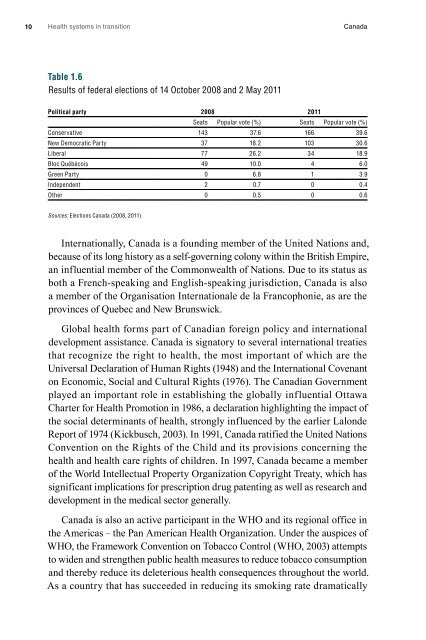Canada - World Health Organization Regional Office for Europe
Canada - World Health Organization Regional Office for Europe
Canada - World Health Organization Regional Office for Europe
You also want an ePaper? Increase the reach of your titles
YUMPU automatically turns print PDFs into web optimized ePapers that Google loves.
10<br />
<strong>Health</strong> systems in transition <strong>Canada</strong><br />
Table 1.6<br />
Results of federal elections of 14 October 2008 and 2 May 2011<br />
Political party 2008 2011<br />
Seats Popular vote (%) Seats Popular vote (%)<br />
Conservative 143 37.6 166 39.6<br />
New Democratic Party 37 18.2 103 30.6<br />
Liberal 77 26.2 34 18.9<br />
Bloc Québécois 49 10.0 4 6.0<br />
Green Party 0 6.8 1 3.9<br />
Independent 2 0.7 0 0.4<br />
Other 0 0.5 0 0.6<br />
Sources: Elections <strong>Canada</strong> (2008, 2011).<br />
Internationally, <strong>Canada</strong> is a founding member of the United Nations and,<br />
because of its long history as a self-governing colony within the British Empire,<br />
an influential member of the Commonwealth of Nations. Due to its status as<br />
both a French-speaking and English-speaking jurisdiction, <strong>Canada</strong> is also<br />
a member of the Organisation Internationale de la Francophonie, as are the<br />
provinces of Quebec and New Brunswick.<br />
Global health <strong>for</strong>ms part of Canadian <strong>for</strong>eign policy and international<br />
development assistance. <strong>Canada</strong> is signatory to several international treaties<br />
that recognize the right to health, the most important of which are the<br />
Universal Declaration of Human Rights (1948) and the International Covenant<br />
on Economic, Social and Cultural Rights (1976). The Canadian Government<br />
played an important role in establishing the globally influential Ottawa<br />
Charter <strong>for</strong> <strong>Health</strong> Promotion in 1986, a declaration highlighting the impact of<br />
the social determinants of health, strongly influenced by the earlier Lalonde<br />
Report of 1974 (Kickbusch, 2003). In 1991, <strong>Canada</strong> ratified the United Nations<br />
Convention on the Rights of the Child and its provisions concerning the<br />
health and health care rights of children. In 1997, <strong>Canada</strong> became a member<br />
of the <strong>World</strong> Intellectual Property <strong>Organization</strong> Copyright Treaty, which has<br />
significant implications <strong>for</strong> prescription drug patenting as well as research and<br />
development in the medical sector generally.<br />
<strong>Canada</strong> is also an active participant in the WHO and its regional office in<br />
the Americas – the Pan American <strong>Health</strong> <strong>Organization</strong>. Under the auspices of<br />
WHO, the Framework Convention on Tobacco Control (WHO, 2003) attempts<br />
to widen and strengthen public health measures to reduce tobacco consumption<br />
and thereby reduce its deleterious health consequences throughout the world.<br />
As a country that has succeeded in reducing its smoking rate dramatically
















